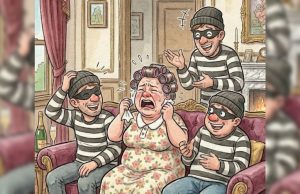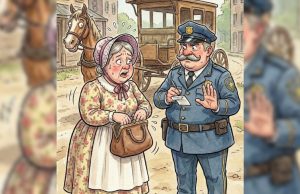
The phone rang just as Elliott Row was standing at the stove. An omelet sizzled in the pan, spreading the rich scent of garlic and butter through the kitchen. He wiped his hands on a towel, glanced at the caller ID, and frowned — the number wasn’t one he recognized.
“Hello?” he answered shortly, continuing to watch the dish.
“Mr. Row, this is your family’s notary. You need to come to me tomorrow morning. There is an inheritance matter. You need to sign some documents.”
Elliott’s parents were alive and well, so from whom could he have inherited anything? He didn’t even ask questions — just silently nodded as if the caller could see him, and hung up.
The next morning, the sky was gray and the city shrouded in fog. When Elliott drove through the city, his mild confusion gradually turned into annoyance. The notary was already waiting for him at the office entrance.
“Come in, Elliott. I understand this all sounds strange. But if it were something ordinary, I wouldn’t disturb you on a day off.”
The office itself was strangely quiet. A place usually full of movement and voices now echoed only with the sound of footsteps on the wooden floor.

Elliott sat across from the desk, arms crossed, guarded.
“This concerns your uncle — Walter Jonas.”
“I don’t have an uncle named Walter,” Elliott immediately objected.
“Nevertheless, he bequeathed you all his property.” The notary carefully placed an old key, a yellowed map, and a sheet of paper with an address in front of him. “A mansion on the water. It now belongs to you.”
“Excuse me… Are you serious?”
“The house is located in the middle of Lake Konamah, in central Connecticut.”

Elliott took the key. It was heavy, covered with a faded pattern. He had never heard of the man or the place. Yet something inside him clicked — that moment when curiosity overcomes common sense.
An hour later, he had packed a few shirts, a water bottle, and some snacks. The GPS showed the lake was just forty minutes away — which only deepened the mystery. How had he never heard of a place so close?
Eventually, the road gave way to a wide, silent lake, its surface like glass. In the center stood a large, brooding house, almost as if it had emerged from the water itself.
On the terrace of a lakeside café, a few elderly men sat with steaming mugs of coffee. Elliott walked up to them.

“Excuse me,” he began, “this house on the lake… do you know who used to live there?”
One of the men slowly set down his cup.
“We don’t talk about that place. We don’t go there. It was supposed to disappear many years ago.”
“But someone lived there, right?”
“We’ve never seen anyone on the shore. Never. Only at night we hear the rustle of boats. Someone restocks supplies, but we don’t know who. And we don’t want to know.”
At the pier, he noticed a faded sign: “June’s Boats.” Inside, a woman with a tired face met him.
“I need a boat to that house in the middle of the lake,” Elliott said, handing over the key. “I inherited it.”
“No one goes there,” she answered coldly. “The place scares many people. Me too.”
But Elliott didn’t back down. His words grew more insistent until she finally agreed.
“All right. I’ll take you. But I won’t wait. I’ll be back tomorrow.”
The house towered over the water like a forgotten fortress. The wooden pier creaked beneath his feet. June carefully tied the boat to the dock.
“We’ve arrived,” she muttered.
Elliott stepped onto the shaky platform and wanted to thank her, but the boat was already pulling away.
“Good luck! I hope you’ll be here waiting for me tomorrow,” she shouted and disappeared into the fog.
Now he was alone.
His hand moved to the lock. The key slid in smoothly and turned with a muted click. Slowly, the door creaked open.

The air inside carried a mix of dust and an unexpected freshness. Sunlight filtered through large windows, partially hidden by heavy curtains. Portraits lined the walls, but one in particular drew his eye — a man standing by a lake, the very same house looming behind him. The caption beneath read: Walter Jonas, 1964.
In the library, shelves brimmed with books, many filled with handwritten notes in the margins. In a corner study, a telescope stood beside carefully arranged notebooks — logs of weather and observations, the most recent entry dated just last month.
“What was he looking for?” Elliott whispered.
In the bedroom — dozens of stopped clocks. On the dresser — a locket. Inside — a photo of a baby with the inscription: “Row.”
“Was he watching me? My family?..”

On the mirror hung a note: “Time reveals what seemed long forgotten.”
In the attic lay boxes with newspaper clippings. One was circled in red: “Boy from Middletown disappeared. Found a few days later unharmed.” The year — 1997. Elliott paled. That was him.
In the dining room, one chair was pushed back. On it lay his school photo.
“This is no longer just strange…” he muttered, feeling noise and confusion in his head.
A knot of anxiety twisted in his stomach. He hastily ate some canned food he found in an old sideboard, then quietly made his way to one of the guest rooms. The bed was made, the sheets surprisingly clean, as if someone had prepared it long ago and never returned. Outside, moonlight shimmered on the lake’s surface, and the house felt strangely alive — breathing in rhythm with the water.
But sleep wouldn’t come. Too many thoughts circled his mind. Who was Walter Jonas? Why was there no mention of him anywhere? Why had his parents never spoken of a brother? And what was behind this eerie connection to himself?
When Elliott finally drifted into a fitful sleep, true night had taken hold — the kind of darkness where every floorboard creak sounds like footsteps, and every shadow seems to move with intent.
A sudden metallic clang shattered the silence. Elliott jolted upright. Then came another sound — like a heavy door creaking open somewhere downstairs. He reached for his phone, but there was no signal. Only his own tense reflection stared back from the dark screen.
He grabbed a flashlight and stepped into the hallway.
The shadows seemed denser now, almost solid. Each footstep echoed with an unease that pressed on his chest. In the library, a few books appeared slightly askew, as though someone had just brushed past them. The study door stood ajar. A chill draft flowed from behind a tapestry on the wall — one he hadn’t noticed earlier.
Pulling it aside, Elliott found a solid iron door hidden behind the fabric.
“Not this,” he whispered, but his fingers instinctively touched the cold handle.
The door gave way with effort. Behind it began a spiral staircase leading down beneath the house, under the water. With each step, the air grew damper, thicker, filled with the smell of salt, metal, and something ancient, as if entering history.
Below stretched a long corridor filled with cabinets and drawers. Labels read: “Genealogy,” “Correspondence,” “Expeditions.”
One drawer was marked: “Row.”
Elliott pulled it out with a trembling hand. Inside lay letters. All addressed to his father.
“I tried. Why do you remain silent? This is important for him. For Elliott…”
“So he didn’t disappear. He wrote. He wanted to know me,” Elliott whispered.
At the end of the corridor was another massive door labeled: “Authorized personnel only. Jonas Archive.” It had no handle — only a palm scanner. A note stuck beside it: “For Elliott Row. Only for him.”
He placed his palm.
Click. The room gently lit up. A projector came to life, and on the wall appeared the silhouette of a man.
Gray hair, tired eyes. He looked straight at Elliott.
“Hello, Elliott. If you see this, it means I am no longer here.”
The man introduced himself: Walter Jonas.

“I… am your real father. You shouldn’t have found out this way, but I’m afraid your mother and I made many mistakes. We were scientists obsessed with survival, climate, protecting humanity. She died giving birth. And I… I was afraid. Afraid of what I might become. So I gave you to my brother. He gave you a family. But I never stopped watching you. From here. From the house on the lake. From afar.”
Elliott sank onto a bench, feeling numb.
“It was you… all this time…”
The voice in the recording trembled:
“I was afraid to break you, but you became a strong, kind person — better than I could have imagined. Now this house belongs to you, as part of your journey, as a chance. Forgive me: for silence, for cowardice, for being near but never truly present.”
The image went dark.
Elliott didn’t know how long he sat in the dark. Then he slowly got up, as if in a dream, and returned upstairs. By dawn, June was already waiting for him at the dock. Seeing him, she frowned:
“Are you okay?”
“Now I am,” he answered quietly. “I just had to understand.”
He went home to talk with his parents. They listened silently, not interrupting. Then they hugged him.
“Forgive us,” whispered his mother. “We thought it would be better this way.”
“Thank you,” he said. “I know it wasn’t easy.”
That night Elliott lay in his bed. The ceiling remained the same. But everything around now seemed different.
A few weeks later, he returned to the lake again. Not to live there, but to restore it. A Center for Climate and History Studies opened in the house. Children ran through the halls, neighbors came with smiles. The house was no longer a refuge of secrets and ghosts. It had become a place of life once more.

















